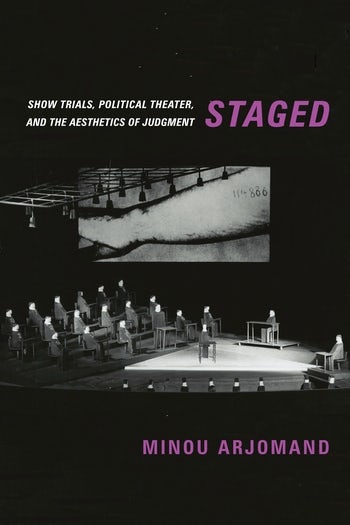Via a recent New Books in History author interview, we learned of a 2018 publication that we failed to note at the time: Staged: Show Trials, Political Theater, and the Aesthetics of Judgment (Columbia University Press), by Minou Arjomand (University of Texas at Austin). A description from the Press:
Theater requires artifice, justice demands truth. Are these demands as irreconcilable as the pejorative term “show trials” suggests? After the Second World War, canonical directors and playwrights sought to claim a new public role for theater by restaging the era’s great trials as shows. The Nuremberg trials, the Eichmann trial, and the Auschwitz trials were all performed multiple times, first in courts and then in theaters. Does justice require both courtrooms and stages?
In Staged, Minou Arjomand draws on a rich archive of postwar German and American rehearsals and performances to reveal how theater can become a place for forms of storytelling and judgment that are inadmissible in a court of law but indispensable for public life. She unveils the affinities between dramatists like Bertolt Brecht, Erwin Piscator, and Peter Weiss and philosophers such as Hannah Arendt and Walter Benjamin, showing how they responded to the rise of fascism with a new politics of performance. Linking performance with theories of aesthetics, history, and politics, Arjomand argues that it is not subject matter that makes theater political but rather the act of judging a performance in the company of others. Staged weaves together theater history and political philosophy into a powerful and timely case for the importance of theaters as public institutions.
A few blurbs:
This is a brilliant work that gives us both a social history and critical theory of postwar theatre. One thinks about the show trial as a terrible miscarriage of justice, but Arjomand gives trial theatre another function: public deliberation and judgment on responsibility and political justice. Whereas much attention has been given to the theatricality of legal trials, Arjomand asks us to value the public function of theatre in enacting debates on justice and establishing a public practice of considered judgment. The history of postwar German theatre offered here engaged in critical theory and aesthetics in a new and engaging argument about aesthetics and politics and the public functions of art in a democracy. -- Judith Butler
Staged marks an exciting moment for scholarship at the intersection of law and theater... emerge[ing] from the long-established insight that law and performance are mutually constitutive. -- Rebecca Kastleman
More information is available here.
-- Karen Tani
